7 All-Natural Ways to Keep Your Garden Pest-Free, According to Experts

Nothing ruins a gorgeous garden like an ugly pest infestation. You could opt for traditional techniques—sprays and the like—but some of those contain chemicals, which are not exactly known for being great for plants (or our pets and ourselves). The good news is that it’s entirely possible to mitigate a scourge of pests just as effectively through all-natural means. From proven tricks (ladybugs!) to some more experimental methods, here are seven all-natural ways, straight from experts, to keep your garden free of pests.
READ THIS NEXT: 8 Easy Houseplants That Don’t Need Sunlight.
7 All-Natural Pest Solutions for Your Garden
1. Diversify your garden.

If you’re facing a pest problem in your garden, you might want to add more diverse plants, specifically those that grow naturally in your region. The goal is to end up with insects that actually help your garden.
“First, you want to balance your ecosystem, which means attracting beneficial insects and (you guessed it) pollinators,” Jennifer Schutter, a certified master gardener and editor of the planting advice site Plantcarefully, tells Best Life. “You generally do this by planting native plants that bloom throughout the year so that you’re providing both sustenance and shelter to your helpful insects.”
2. Plant marigolds and mums.
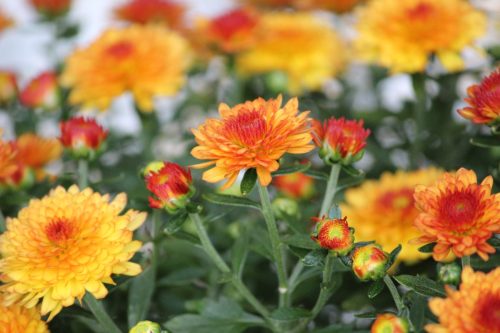
Both of these flowers are well-known pest repellents. As the National Pesticide Information Center explains, Chrysanthemums contain a chemical called pyrethrin, which is a natural pesticide.
“Pyrethrins are commonly used to control mosquitoes, fleas, flies, moths, ants, and many other pests,” they note.
Marigolds, on the other hand, have a scent that pests dislike. A 2019 study out of Newcastle University found that the flower contains a chemical called limonene, which was proven to repel whiteflies from tomato plants. This is why you’ll often see marigolds planted around the periphery of a vegetable garden.
READ THIS NEXT: The 6 Best Herbs to Plant for Beginners, Experts Say.
3. Unleash the ladybugs.
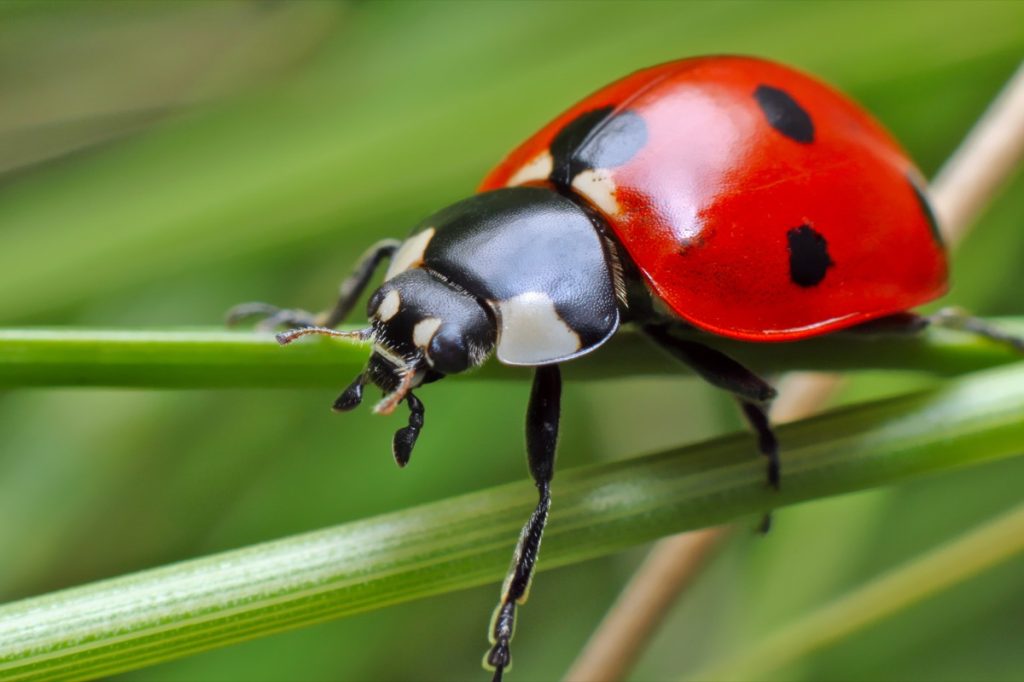
If you’re looking for an all-natural pest control solution, you’ve probably heard of the ladybug method—and for good reason.
“Ladybugs naturally prey on several common garden pests such as mites, aphids, and whiteflies, without the use of harmful pesticides,” explains Robert Silver, a certified master gardener and the CEO of Pro Gardening Blog. “To build a suitable environment for them, consider providing them with water and shelter, and planting flowers that produce nectar and pollen, which are their primary food sources.”
There’s just one thing to keep in mind. “You need to make sure you’re buying ladybugs native to your area,” Schutter adds.
4. Try herbal pest repellents.
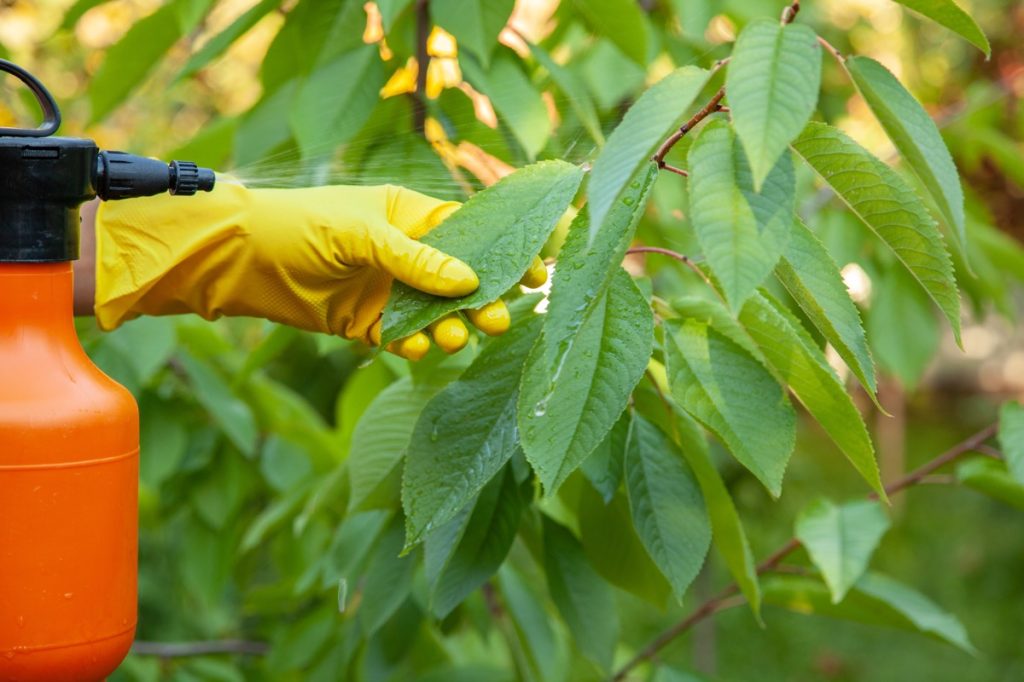
If you’re avoiding pest repellant because of its chemical properties, consider an herbal-based spray—something like Mighty Mint’s all-natural alternative.
“Using herbal pest repellents is a safer alternative to chemical-based repellents for both humans and pets. This is because herbal repellents are made from natural ingredients, which are less likely to have harmful side effects,” Silver says. “Herbal repellents can be effective in controlling pests such as mosquitoes, flies, and ants.
For more garden advice delivered straight to your inbox, sign up for our daily newsletter.
5. Grab some garlic.
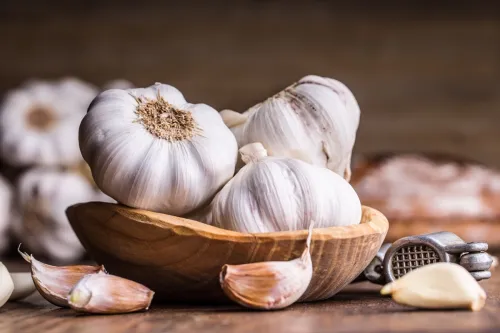
There’s also an herbal pest repellent you can make yourself, and all you’ll need is a head of garlic, a blender, and water.
As Best Life previously explained, simply blend a head of garlic until it’s a paste-like consistency. Add two cups of water and blend again. Then, put the mixture in a glass container and let it sit in a dark spot for 24 hours. Finally, strain it and add enough water to fill a gallon container. And there you have your garlic pest spray.
This works because the active sulfur compounds in garlic create a scent that deters insects. And as a bonus, it’s also a natural snake repellent.
Do note, however, that garlic is toxic to dogs, so you may not want to go this route if your four-legged friend will be playing around your garden.
6. Sprinkle cinnamon.

Cinnamon is another scent insects don’t like, “so you can sprinkle some around the plant itself to keep them away,” Ray Brosnan, gardening expert and founder of Brosnan Landscape Gardening, previously told Best Life.
The scent also repels squirrels and rabbits, if they’ve been munching on your plants, and it is a great anti-fungal treatment, which is especially helpful when outdoor plants are in the seedling phase.
READ THIS NEXT: This Is the One Weed You Should Never Pull, Experts Say.
7. Do it by hand.
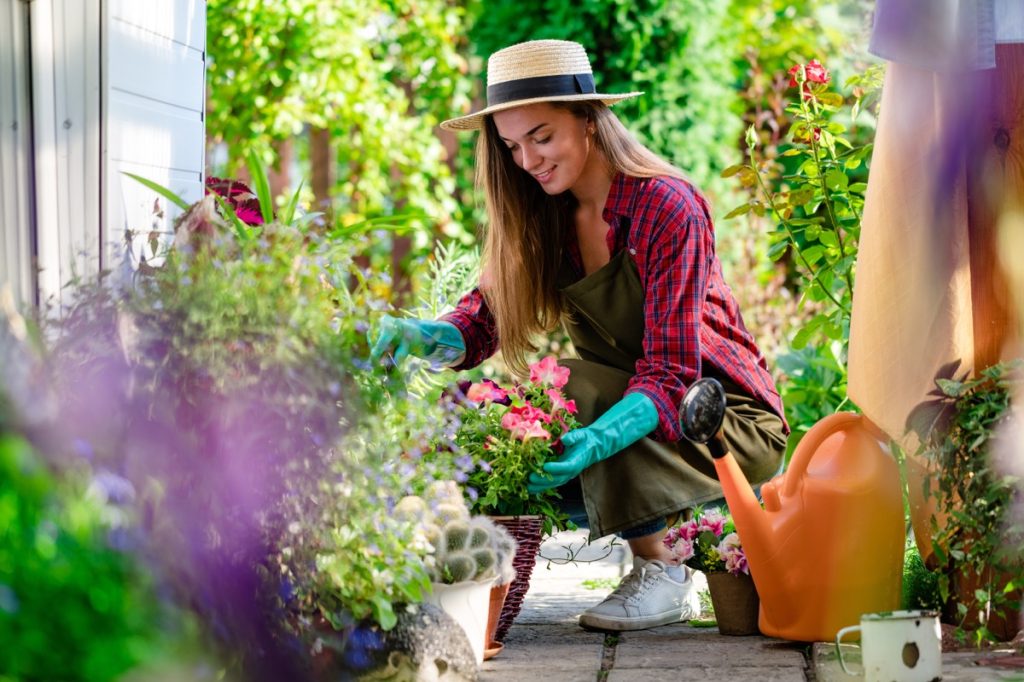
A fair warning: Do not try this if you have a ton of ground to cover. But one of the most ironclad methods of pest control is also the simplest. Get on your hands and knees, personally inspect your plants for unwanted bugs, and manually remove them.
“Regular inspection and handpicking can be an eco-friendly and cost-effective way to control pest populations in a small garden,” Silver said. “This approach is particularly useful for small gardens, where pests can be easily spotted and removed by hand.”
There’s also an added benefit to getting your hands dirty: Doing so can reveal the root causes of why pests may be infiltrating your garden in the first place, such as “low soil quality or overwatering,” says Silver.